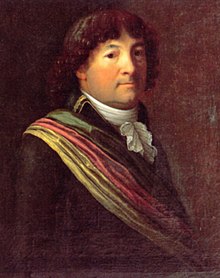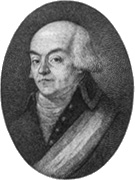Helvetic Directory

The Helvetic Directory was the executive in the Helvetic Republic from 1798 to 1803 . It corresponded to the directional system of government that had emerged in France at the time .
Emergence
A complicated dispute broke out between January and March 1798 over the new constitution of Switzerland. In addition to the uniform constitution approved in Paris, other drafts of the constitution were circulating in the cantons, which - depending on the situation - provided for more or less autonomy for the cantons. The Directory therefore ordered General Brune on January 27th to split up the Confederation, primarily to secure the connection between France and Northern Italy via the Simplon and Great St. Bernard passes . Brune then founded the Rhodan Republic on March 16 , consisting of Vaud , Friborg , the Bernese Seeland , the Bernese Oberland , the Valais and the Ticino ; The capital should be Lausanne .
The rest of the Confederation was to form two states: The Helvetic Republic of twelve cantons with the capital Aarau and Tellgau, consisting of central Switzerland and Graubünden. After Laharpe's intervention in Paris, the board of directors finally decided against the partition plan, which is why Brune revoked the partition on March 22nd. The first Helvetian directorate - the government - consisted of Johann Lukas Legrand , Pierre-Maurice Glayre , Urs Viktor Oberlin , David Ludwig Bay and Alphons Pfyffer . Through clever tactics in the elections, the moderate Republicans were able to win all the seats for themselves; the patriots Ochs and Laharpe were not elected. The position of the Directory was weakened from the start, as the Patriots did not support the Directory and used their good contacts with the French to undermine Republican policies.
When the Helvetic Republic was constituted, the disunity between the cantons had become evident due to the absence of the cantons from central and eastern Switzerland. The rural parish cantons did not want to sacrifice their sovereignty, the numerous small Eastern Swiss cantons and republics that were only released during the Helvetic Revolution held on to the freedom they had just gained and the old republics of Valais and the Three Leagues no longer saw themselves as part of the Confederation. In the Catholic areas in particular, the population, under the influence of the clergy, rejected the Helvetic Constitution as a “book of hell” - because of religious freedom, which was understood as an attack on the Church. The patrician families feared losing their political influence, but also their income, which was mainly fed by the pensions of the mercenaries and the income from the subject areas.
Following the peaceful efforts of the French envoys and the representatives of the Helvetic Republic, only Obwalden and - after a twelve-day ultimatum on April 11, 1798 - the states of Eastern Switzerland joined the republic. Uri , Schwyz , Zug and Nidwalden then went on to attack under the command of Schwyz Governor Alois von Reding and were able to advance into Freiamt , Rapperswil , Lucerne and the Brünig Pass. When General Schauenburg counterattacked, the resistance was broken after three days. Reding had to consent to an honorable capitulation on May 4, 1798 , despite military successes at Rothenthurm . The resistance of the Valais was also broken by French troops on May 17th. The Swiss cantons of Bellinzona and Lugano were constituted in the former Ennetbirgischen bailiwicks in Ticino in July and August.
The original division of the cantons of the Helvetic Republic was revised again after the resistance of central Switzerland. The rural community cantons of Uri, Schwyz, Zug, Glarus , Appenzell and Unterwalden should actually have remained as cantons despite their small population, because it was hoped that this would win them over to the new constitution. After their violent conquest, Uri, Schwyz, Zug and Unterwalden were combined to form the canton of Waldstätte , Glarus with the Sarganserland to form the canton of Linth and Appenzell with St. Gallen to form the canton of Säntis . The political weight of the rural cantons was reduced from 48 to 12 in the Senate and from 40 to 15 in the Grand Council.
A big problem for the Helvetic Republic from the beginning was the French occupation, to which it actually owed its existence. Financing the occupation costs through war taxes put a huge strain on Switzerland's financial performance: France had not only confiscated the entire state assets of the republics of Bern, Friborg, Solothurn, Lucerne and Zurich as well as their entire arsenal holdings (from Bern alone approx. 6 million francs in cash and 18 million in bonds), but a further 16 million francs had to be paid as a formal war tax, which the patriciate was supposed to raise. With the campaign in Switzerland - according to French calculations - the French state is said to have collected the sum of 20 million francs, which was enormous for the time. This does not include the costs of billeting, looting, embezzlement and bribes. Most of the money went directly to financing the Egyptian campaign . Because of the burdens of the crew, there was constant tension between the Helvetian directorate and the French commissioner Jean-Jacques Rapinat . In June, therefore, at his pressure, the directors Bay and Pfyffer were deposed and replaced by Laharpe and Ochs, who were devoted to France.
Members of the Board of Directors
The members of the director from April 1798 to January 7, 1800
- David Ludwig Bay (Republican); April 18 - June 18, 1798, January 3 - June 22, 1799; President March 6 - April 26, 1799
- Frédéric-César de la Harpe (Patriot / Unitarian); June 29, 1798 - January 7, 1800; President August 1 - August 31, 1798, October 1 - November 21, 1798, and January 24 - September 4, 1799
- Johann Lukas Legrand (Republican); 1798 - January 25, 1799; President April 22 - May 31, 1798
- Urs Viktor Oberlin (Unitarian); April 18, 1798 - January 7, 1800; President June 1 - July 1, 1798 and November 22, 1798 - January 12, 1799
- Peter Ochs , (Patriot / Unitarian); June 1798 - June 25, 1799; President September 1 - September 30, 1798, April 27 - June 23, 1799
- Alphons Pfyffer (Republican); April 18 - June 18, 1798
- Philippe Abraham Louis Secretan (Unitarian); - January 7, 1800
- Johann Rudolf Dolder (federalist); 1799 - January 7, 1800; President November 18, 1799 -. January 1800
- François Pierre Savary (federalist); 1799 - January 7, 1800; President September 5 - November 17, 1799
- Pierre-Maurice Glayre (Unitarian); April 18 - May 9, 1799; President July 2 - July 31, 1798, January 13 - March 5, 1799
literature
- Andreas Fankhauser: Board of Directors. In: Historical Lexicon of Switzerland .
Web links
- Helvetic Republic from Wikicommons



